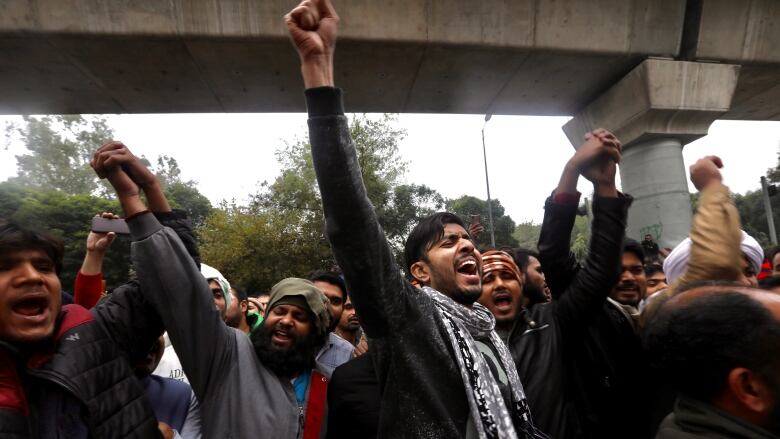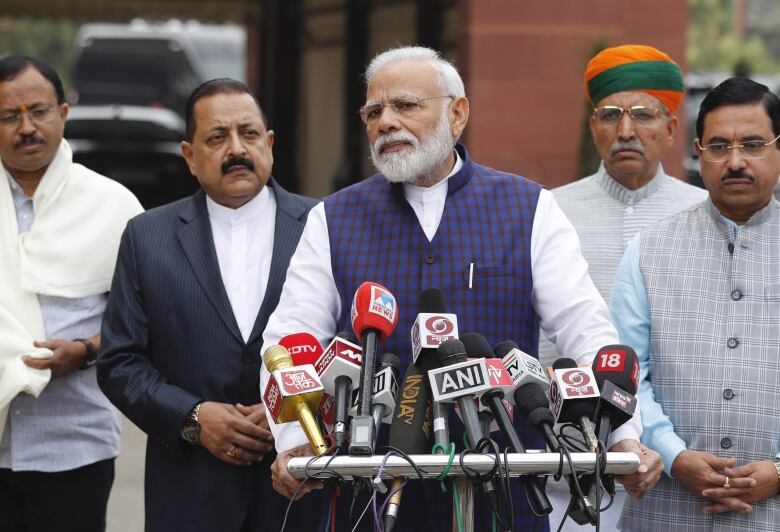Why India's controversial citizenship law has sparked violent protests
The government denies the bill discriminates against Muslims

The passage of a controversial citizenship law in India's parliament has sparked violent protests across the country.The Citizenship AmendmentBill provides a pathway to Indian citizenship forHindus, Sikhs, Buddhists, Jains, Parsis and Christians who fled to India from Muslim-majority Pakistan, Bangladesh and Afghanistan before 2015.
But the bill excludes Muslims who fledpersecutionfrom those neighbouring countries, prompting opponents of the lawto accuse the government of discrimination.
CBC Explains takes a closer look at thecontroversy surrounding the bill.
Who is protesting?
Many of those staging protests in the capital New Delhi and other urban centres are politicaland student activistswho claimthe lawis prejudicial againstMuslims,will further marginalize Muslims in India, anderodes India's secular foundations.
VIDEO: New citizenship bill triggers massive protests
But there are others, in the border state of Assam, for example, and other northeastern states bordering Bangladesh, who fear the impact of so many new legal residents on their communities.
Assam has passeda citizenship registry intended to identify legal residents and weed out those without documentation.The Citizenship Amendment Bill could provide protection and a fast track to naturalization for many of the Hindus living there.
"They don't want the demography over their own state changed, even if these people are not Muslim," said SumitGanguly, the Rabindranath Tagore Chair in Indian Cultures and Civilizations at Indiana University.
What is the government's rationale for the bill?
The Hindu nationalist-led government of Indian Prime Minister Narendra Modi has argued that the law supports oppressed minorities from Pakistan, Bangladesh and Afghanistan and that India should be a haven for them.
"No Indian has anything to worry regarding this act," the prime minister said in a recent tweet."This act is only for those who have faced years of persecution outside and have no other place to go except India."
Senior leader of Modi's ruling Bharatiya Janata Party (BJP), Ram Madhav, insisted in a tweet that the bill "isnot about excluding anybody; it is about INCLUDING refugees from [Pakistan, Afghanistan and Bangladesh], victims of religious persecution or fear of it."
Meanwhile,Home Minister Amit Shah hassaid the bill isnot anti-Muslim because it did not affect the existing path to citizenship available to all communities.
CAB is not about excluding anybody; it is about INCLUDING refugees from Pak-Af n B'desh, victims of religious persecution or fear of it. We granted them citizenship in 1951 first;doing it again now bcoz many had come in last 7 decades n living here for decades without citizenship
—@rammadhavbjpThe government claims thatbecause Pakistan, Afghanistan and Bangladesh are Muslim-majority countries, Muslims cannot be treated as persecuted minorities.
"They claim that only non-Muslims are being discriminated against in those states," said Aparna Sundar, alecturer atthe Munk School of Global Affairs andPublic Policy specializing in South Asian studies.
What do criticssay?
Critics argue that the bill is too selective, that if the government was truly concerned about persecutedminorities in neighbouring countries, it would include groups like theRohingya Muslims in Myanmar, orthe Ahmadis, a Muslim sectinPakistan.
"It has nothing to do with India suddenly being a haven foroppressed, religious minorities. This is simply a way of marginalizing Muslims further in India," said Ganguly.
As well,some rights organizations say the bill couldgive officials more impetus todeport thousands of Muslims living in thestate of Assam without documents to prove Indian citizenship.
Also, while the term "persecuted minorities" can be found in the bill's statement of objectives, orthe legal reasoning behind it, the term is nowhere in the text of the bill itself, said Niraja Gopal Jayal, a professor at the Centre for the Study of Law and Governance at New Delhi's Jawaharlal Nehru University.
"There is, therefore, no requirement for anybody to prove that they are in fact fleeing persecution," she wrote in an email to CBC News.
Is it constitutional?
Those arguing the bill is constitutional say a classification based on religion is reasonable, Jayal said.
However,the bill does seem to be in violation of several provisions of India's constitution, especially Article 14, which guarantees to all persons, and not just citizens,the right to equality before the law and the equal protection of the law, she said.
"It creates gradations of citizenship based on religion, which is clearly discriminatory," she said.

As well, the bill may alsoviolate the basic structure of the constitution, of which secularism is an integral part, she said.
"India's laws and constitution are secular. By introducing a religious test for citizenship, this amendment introduces a religious criterion in the hitherto religion-neutral law."
Could there be a reversal?
So far, despite the protests, the government is standing firm. Addressing a recent rally, Modi claimed thedecision to implement the act was "1,000 per cent correct."
The law is being challengedlegally, and it is possible the courts could rule against the government.
In the past, India's Supreme Court has been quite unpredictable, at times siding with the government, and other times showing "a great deal of independence," Gangulysaid.
Butthe chief justice in India recently criticized the protesters, he said, a signal possibly that the court"is not goingto enter this particular thicket, and if it does, it will rule in favour of thegovernment."
On Wednesday, India's Supreme Courtpostponed hearing pleas challenging the constitutionality of the new citizenship law. The court said it would consider the pleas on Jan. 22.
With files from Reuters, The Associated Press













_(720p).jpg)


 OFFICIAL HD MUSIC VIDEO.jpg)
.jpg)



























































































